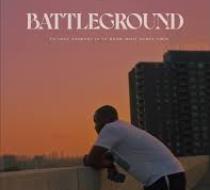Battleground Favorite
The opening lines of this week’s Staff Pick Premiere, “Battleground,” by Kwesi Thomas and Mark Bone examine how skin color has become just that…a battleground. The short captures the particular discomfort of having to argue for one’s value in a society that should care instead of question. Kwesi, a Black man, powerfully conveys these feelings to his co-director Mark, a white man, in the wake of George Floyd’s death last May.
Through archival footage and a series of introspective discussions and interviews, this collaborative documentary attempts to allow “non-Black people to partially enter into that shifting, paradoxical place which is being Black in North America. The film [is] an attempt to articulate the confusing, vertiginous, experience of one’s skin being a site of social conflict, a ‘battleground,’” states Thomas. “It [is] not, however, an attempt to clarify that experience.”
Now nearly a year after Floyd’s death, the day after Derek Chauvin’s guilty verdict, and in the wake of countless other Black deaths at the hands of police, “Battleground” is entering the conversation. Our team at Vimeo has found it to be essential viewing as we ourselves process these events and their meaning.
Mark: “After the death of George Floyd I decided to reach out to a couple of my closer Black friends, including Kwesi, to check in and see how they were doing. This event seemed to give them a platform they might not have felt they had in the past to be more honest about their experiences with racism growing up with their white friends.
Soon I realized how little I understood about their journeys and how shocking some of their encounters had been. I asked Kwesi if I could begin recording our conversations on camera so more people could understand his experience. I had the camera gear but Kwesi had the vision.”
Kwesi: “It is difficult to pinpoint a particular situation that I did not feel heard, because in many ways it seems that the structure of our society is such that most people go their whole lives without being deeply engaged by others. However, in the vast majority of my friendships with white people pre-George Floyd, which also happen to be the majority of my friendships, I had never shared my experiences of racism and Blackness.
There are many reasons for this, but the strongest one is that bringing up race as a Black person puts you in a compromised social position. It is almost as if you are disturbing some sort of social contract, like when one brings up religion or politics at a dinner party. And since the vast majority of non-Black people have no point of relation to empathize with experiences of racism, you are lucky to be met with anything more than “I’m so sorry that happened to you” when sharing your story. When George Floyd was murdered, for the first time in my life it felt like race was a public conversation that could be broached. This film is an attempt to seize that moment of opportunity, however transitory it may be.”
Mark: “These people in this film are really just my friends from Toronto. They are people in my community willing to speak about their experiences and share their challenges. Despite the length of time I’ve known some of them, I haven’t ever sat down with them and directly spoken about race and racism. Race can be a challenging conversation to engage with so it felt like we had an opportunity based on everyone’s willingness after the George Floyd events to invite an audience in on their personal experiences with race/racism.
I wanted to illuminate that racism can occur in small ways but still have a lifelong impact. A knee on a man’s neck for 8 minutes is shocking but I didn’t want to overlook the smaller moments of injustice that don’t make news headlines. The film explores these moments.”
Kwesi: “It has been said to the point of cliche, but what is necessary in these moments is firstly listening. Only when one has listened to and internalized the stories of Black persons, are they prepared to speak or act productively on the issues which face them.”
Mark: “I don’t think allyship is just repeating that racism is bad on Instagram. In my experience, allyship is as unique as is the individual that you’re speaking with. Before we started filming we conducted about a dozen interviews with different members I know from the Black community in Toronto and every person had a different reaction and response when we asked “how can I help?” If someone is willing to share it then I think the best place to start is to ask about the nuances of their journey, understanding the events and emotions. I rather ask more questions right now. The more I know, the better I can help.”







